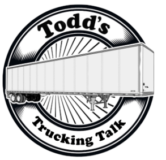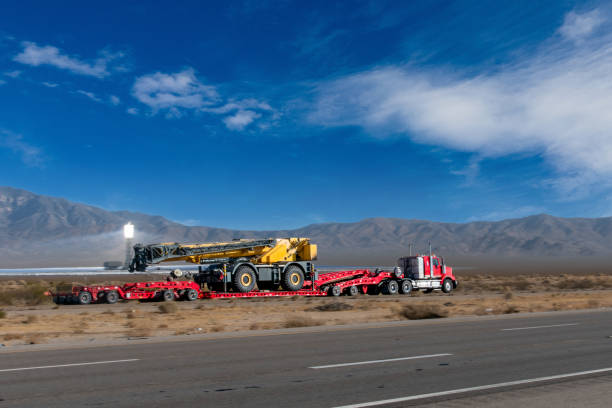
Discover the different types of semi trailers and their uses, including flatbeds, dry vans, reefers, tankers & more.
Types of Semi Trailers and Their Uses
There are many different types of semi trailers that serve many different purposes. Some are designed to carry heavy loads, while others are designed for speed and agility. Here is a list of the most common types of semi trailers and their uses:
Heavy Haul Trailers: Heavy haul trailers are designed to carry extremely heavy loads. They are usually low to the ground and have a very strong frame.
Flatbed Trailers: Flatbed trailers are one of the most versatile types of semi trailers. They can be used to carry a variety of different loads, including construction materials, vehicles, and large machinery.
Refrigerated Trailers: Refrigerated trailers are used to transport perishable items that need to be kept at a certain temperature. This type of trailer is equipped with a special cooling system that keeps the inside of the trailer at a consistent temperature.
Step Deck Trailers: Step deck trailers are similar to flatbed trailers, but they have a raised platform at the front of the trailer. This platform is used to load and unload equipment that is too tall for a flatbed trailer.
tanker Trailers: Tanker trailers are used to transport liquids and gases. They are equipped with tanks that are specially designed to safely store these materials.
Intermodal Trailers: Intermodal trailers are designed to be used with intermodal containers. These containers can be loaded onto a train, ship, or truck and transported to their destination without having to be unloaded.

Flatbed Trailers
A flatbed trailer is a type of trailer that has a flat, level bed without any sides or a roof. These trailers are typically used to haul large, heavy items that are not easily transported using a standard trailer. Some examples of items that are often transported using a flatbed trailer include: large pieces of machinery, lumber, and construction materials.
There are many different types of flatbed trailers on the market, each designed to accommodate specific types and sizes of loads.
The most common type of flatbed trailer is the drop-deck trailer, which has a deck that can be lowered to the ground to make loading and unloading easier. Other popular types of flatbed trailers include: gooseneck trailers, which have a gooseneck hitch for increased maneuverability; and detachable gooseneck trailers, which can be easily detached from the tractor for use as a standalone trailer.
No matter what type of flatbed trailer you are using, there are some important safety considerations to keep in mind. When loading and unloading, be sure to use proper lifting techniques to avoid injuries. And when transporting your load, be sure to secure it properly to prevent shifting and damage.
If you’re in need of a flatbed trailer for your next haul, be sure to choose the right one for the job. And most importantly, always practice safe loading and transportation procedures to ensure a safe and successful journey.

Dry Van Trailers
A dry van is the most popular type of trailer used in the trucking industry. Dry vans are used to transport non-perishable items that do not need to be refrigerated or kept at a certain temperature. Dry vans are the most versatile type of trailer and can be used to haul a variety of goods.
There are many different types of dry van trailers on the market, each with their own unique features and benefits. Some of the most popular types of dry van trailers include:
Standard dry van trailers: Standard dry van trailers are the most common type of dry van trailer on the market. They are typically 28 feet long and can haul up to 26,000 pounds of cargo. Standard dry van trailers have a variety of features that make them well-suited for hauling a variety of goods, including:
-Roll-up doors: Roll-up doors are the most common type of door on dry van trailers. They are easy to use and provide a tight seal that helps to keep cargo secure during transport.
-Side doors: Side doors are becoming increasingly popular on dry van trailers. They provide easier access to the cargo than roll-up doors and can be used for loading and unloading smaller items.
-Tie-downs: Most dry van trailers have built-in tie-downs that can be used to secure cargo during transport.
Reefer trailers: Reefer trailers are dry van trailers that are equipped with a refrigeration unit. Reefer trailers are used to transport perishable items that need to be kept at a certain temperature.
Reefer trailers are available in a variety of sizes, from 28 feet to 53 feet, and can haul up to 40,000 pounds of cargo.
Insulated trailers: Insulated trailers are dry van trailers that have been outfitted with insulation to keep the inside temperature stable. Insulated trailers are typically used to transport temperature-sensitive items, such as pharmaceuticals or chemicals.
Double-deck trailers: Double-deck trailers are dry van trailers that have two decks, or levels, of cargo space. Double-deck trailers are typically used to transport lightweight goods, such as boxes or small crates.
Flatbed trailers: Flatbed trailers are dry van trailers that have a flat, open deck, without sides or a roof. Flatbed trailers can be used to transport large, bulky items that would not fit on a standard dry van trailer.
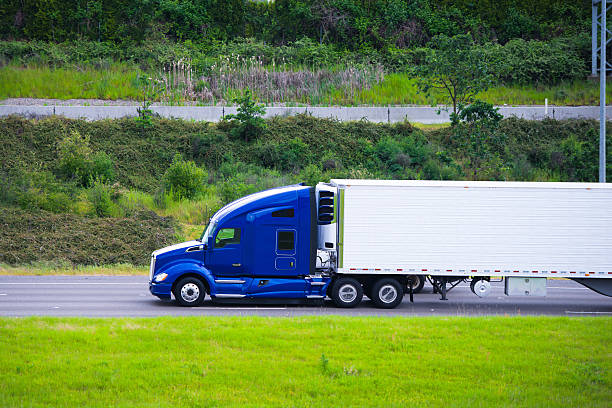
Refrigerated (Reefer) Trailers
There are many different types of trailers on the market today, but one type that is becoming increasingly popular is the refrigerated (reefer) trailer. These trailers are designed to keep your cargo cool and fresh, making them ideal for transporting perishable goods. Here is a look at some of the different types of refrigerated trailers that are available:
– Standard Reefer: This is the most basic type of refrigerated trailer and is typically used for transporting food items. The temperature inside the trailer can be controlled via a thermostat, making it easy to keep your cargo at the perfect temperature.
– Insulated Reefer: An insulated reefer is a bit more specialized than a standard reefer, as it is designed to keep your cargo at a specific temperature. This can be helpful when transporting delicate items that require a very specific temperature range.
– Multi-Temp Reefer: A multi-temp reefer is the most versatile type of refrigerated trailer, as it can be used to transport items that require different temperature ranges. This type of trailer has multiple compartments, each of which can be set to a different temperature.
– Deep Freeze Reefer: A deep freeze reefer is designed for transporting items that need to be kept at very cold temperatures, such as frozen goods. The inside of the trailer is typically kept at -20 degrees Fahrenheit or below.
No matter what type of refrigerated trailer you need, there is sure to be one that meets your needs. These trailers are becoming increasingly popular due to their ability to keep cargo fresh and cool, making them ideal for a variety of applications.

Tanker Trailers
A tanker trailer is a type of truck trailer designed to carry liquid cargo. The most common type of tanker trailer is the fuel tanker, which is used to transport gasoline, diesel, and other types of fuels. Other types of tanker trailers include chemical tankers, which are used to transport chemicals, and water tankers, which are used to transport water.
Tanker trailers are designed to carry large amounts of liquid cargo, and are typically much larger than other types of truck trailers. Tanker trailers are made from a variety of materials, including aluminum, stainless steel, and fiberglass. The material used depends on the type of liquid being transported and the operating conditions of the trailer.
Tanker trailers are usually equipped with one or more pumps that are used to load and unload the cargo. The pumps are typically located at the front of the trailer, and are operated by the driver. Tanker trailers are also equipped with a variety of valves and fittings that are used to control the flow of the cargo.
Tanker trailers are subject to a variety of regulations, depending on the type of cargo being transported. Fuel tankers, for example, are subject to regulations governing the transportation of hazardous materials. Chemical tankers are subject to regulations governing the transportation of hazardous chemicals. Water tankers are subject to regulations governing the transportation of potable water.
Tanker trailers are an essential part of the trucking industry, and are used to transport a wide variety of liquids across the country. If you need to transport liquid cargo, a tanker trailer is the perfect solution.

Car Carrier Trailers
A car carrier trailer is a specialized trailer that is designed to transport automobiles. They come in a variety of sizes and types to accommodate different needs.
The most common type of car carrier trailer is the open trailer. As the name suggests, this type of trailer does not have a roof or sides. Cars are loaded onto the trailer from the top, and they are secured with straps or chains. Open trailers are the most economical option for transporting cars, but they offer the least amount of protection from the elements.
The next type of car carrier trailer is the enclosed trailer. Enclosed trailers have four walls and a roof, and they are the best option for protecting your cars from the weather and road debris. They are more expensive than open trailers, but they offer peace of mind knowing that your cars will arrive at their destination in the same condition that they left in.
The last type of car carrier trailer is the flatbed trailer. Flatbed trailers have a flat, level surface with no walls or roof. Cars are loaded onto the trailer from the side or the rear. Flatbed trailers are the most versatile type of car carrier trailer, but they offer the least amount of protection for your cars.
No matter what type of car carrier trailer you choose, make sure that you research the company that you are renting it from. Read reviews and compare prices to make sure that you are getting the best deal.
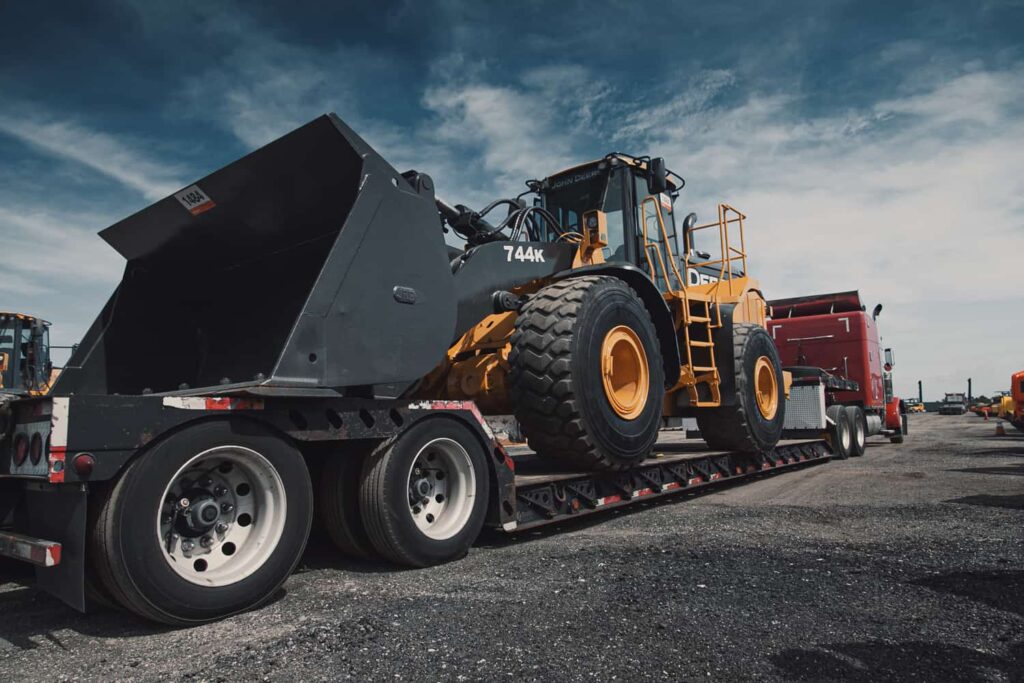
Lowboy Trailers
A lowboy trailer is a type of flatbed trailer that has a very low deck height. They are designed to carry heavy loads and are often used to transport construction equipment. There are several different types of lowboy trailers, each with its own advantages and disadvantages.
The most common type of lowboy trailer is the drop-deck lowboy. These trailers have a deck that drops down in the front, making it easy to load and unload heavy equipment. However, because of the low deck height, drop-deck lowboys can only carry loads that are less than 12 feet tall.
Another type of lowboy trailer is the gooseneck lowboy. These trailers have a gooseneck hitch in the front, which allows them to carry loads that are taller than 12 feet. However, because of the gooseneck hitch, gooseneck lowboys can be difficult to maneuver.
A third type of lowboy trailer is the removable gooseneck lowboy. These trailers have a gooseneck hitch that can be removed, making them more maneuverable than gooseneck lowboys. However, because the gooseneck hitch is removable, these trailers can only carry loads that are less than 12 feet tall.
Lowboy trailers are an essential piece of equipment for many businesses, but they are not without their drawbacks. One of the biggest problems with lowboy trailers is that they can be very difficult to park. Because of their low deck height, they often have clearance issues when trying to park in tight spaces. Additionally, lowboy trailers can be very difficult to back up, especially if you are not used to driving one.
Despite their challenges, lowboy trailers are an essential piece of equipment for many businesses. If you need to transport heavy loads, a lowboy trailer is the best way to do it.
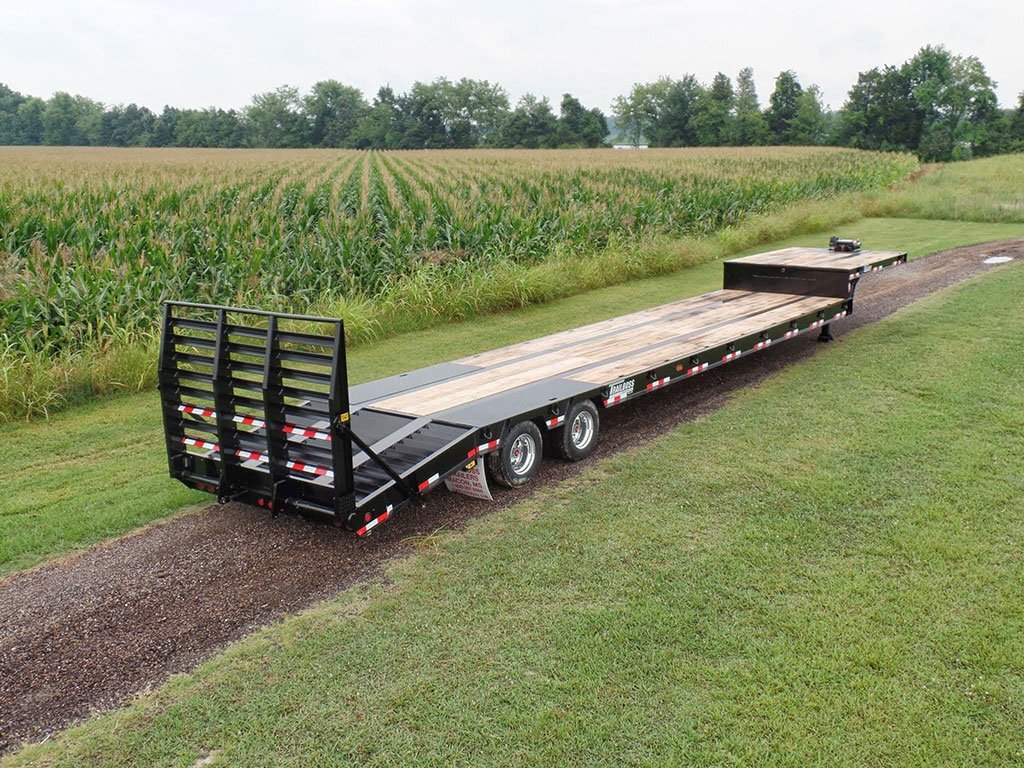
Step Deck Trailers
There are many different types of tractor trailers on the road today. Each type of trailer serves a different purpose and is designed for different types of loads. One type of trailer that is becoming increasingly popular is the step deck trailer.
A step deck trailer is a type of flatbed trailer that has a lower deck and an upper deck. The lower deck is typically about four feet high, while the upper deck is about two feet high. This allows the trailer to be used for taller loads on the upper deck while still being able to haul shorter loads on the lower deck.
One advantage of step deck trailers is that they can be loaded from the side as well as from the rear. This makes them ideal for loading vehicles that are too tall to fit on a standard flatbed trailer. Another advantage of step deck trailers is that they can be used to haul two different types of loads at the same time. For example, you could load a vehicle on the upper deck and a piece of machinery on the lower deck.
If you are looking for a versatile and durable trailer, then a step deck trailer may be the right choice for you.
Benefits of Using Semi Trailers
There are many benefits of using semi trailers over other types of trailers. For one, semi trailers are much more stable and less likely to tip over. They are also better able to handle heavy loads, making them ideal for hauling large items. Additionally, semi trailers can be easily detached from the truck, making them perfect for switching between different trucks or for storage.
